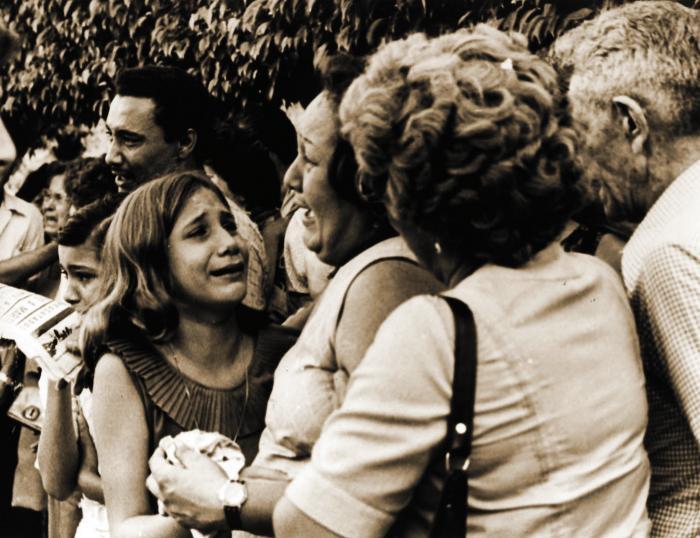
"Girls love their fathers more". It's a popular saying that we don't know if it's the result of the repetition of so many fathers who are accomplices of their daughters, or of the jealousy of mothers who, no matter how much they are worn out by the hair, the clothes, the nails, the menstruation, the secrets and the whims of their little girls, make an amused grimace when they see them "looking for their father who pampers and spoils them".
Lida María wanted her daddy every day, but - at least until she was ten - she grew up watching him come and go. The good thing was that he came and went quickly, and the bad thing was to miss him all the time, to know that "today he will come," and to stand at the door waiting for him, because he would bring a hug, a gift, and a story from a new place; that, to tell the truth, had its charm.
Tomás González Quintana was an operations technician for Cubana de Aviación, and on the flight home from Barbados he brought his girls a hug, a swashbuckling story and a gift from Venezuela.
On October 6, 1976, Lida María was ten years old and Bebita was four, and "we sat at the door of the house waiting, as we always did when we knew my father was coming.”
She did not know it was that day, she was not aware of it, no child is aware of these things when there are other more important things: games, dolls... waiting for their father.
"We saw a black car slowing down and we thought it was him, but when it stopped, two people in Cuban uniforms got out and asked us about my mother. We told them she was working and they asked to see my grandmother.”
Lida told Rubén in writing, in a letter. She didn't have the strength to talk about it, and he never asked her about it for 23 years, since the day she learned about her classmate's father. But in 1999, Rubén, a journalist from Granma, called her with great sensitivity to interview her, and she gave him the letter.
That October 6, Bebita was four years old, but Lida was ten, and although those in the black car asked for privacy, she remained listening, hidden, unseen, until she collapsed to the ground, "as if I had received a big blow," when she learned that the plane her father was on had had an "accident.”
The "accident" was sabotage, a bomb placed on the civilian plane by a notorious criminal paid by the CIA, the armed wing of the U.S. government, the first culprit responsible for the explosion of that plane in the air over the coasts of Barbados, with 73 people on board, 53 of them Cuban, including Tomás, Lida and Bebita's father, among the Cubans.
Lida says that when she woke up on the 7th, she was already a woman, because only a woman can cry so much and endure so much pain, although "for more or less five years" she continued to dream impossible dreams, like a child: "I had the idea that maybe he was not on the plane and nobody knew, and every time they knocked at the house I thought he had returned. Eventually I realized that I was really deluding myself, that it was hopeless.
"They had taken away my father, a man who loved his wife, his daughters, the sea, airplanes, sports, who had a great capacity for love, who, although they say men don't cry, cried with emotion when Alberto Juantorena won in the Montreal Olympics.
"They took from me the opportunity to mature, to share more time with him, to tell him my problems, my worries, to live a little more with him. No one can give that back to me, to my mother, to my sister. ... Only we and the other children, wives and mothers of those who came with him know how much we suffered at that moment and how much we have suffered...
"As for me, although I know how to smile, nothing has ever been the same again. Not a day goes by that I don't think of him, even once: when I eat mango ice cream, which was his favorite; when I look at the sea; when I see our children growing up without their grandfather, who would have loved them so much."
Luis Posada Carriles was the name of his father's assassin. He died of old age, in Miami, untouched by anyone, protected by the U.S. government, which had paid him for all the terrorist acts he committed.
When Lida wrote the letter, the terrorist was still alive, and she had faith that one day he would pay, but the guy slept peacefully until his death.
"Unlike him, I have never had a happy dream again; I always dream of falling airplanes."
But the U.S. government likes to say that Cuba supports terrorism, and for many years they say it does, and then they says it doesn't, for a few days, and then they says it does. Are we the terrorists?
Source: Granma newspaper archive















